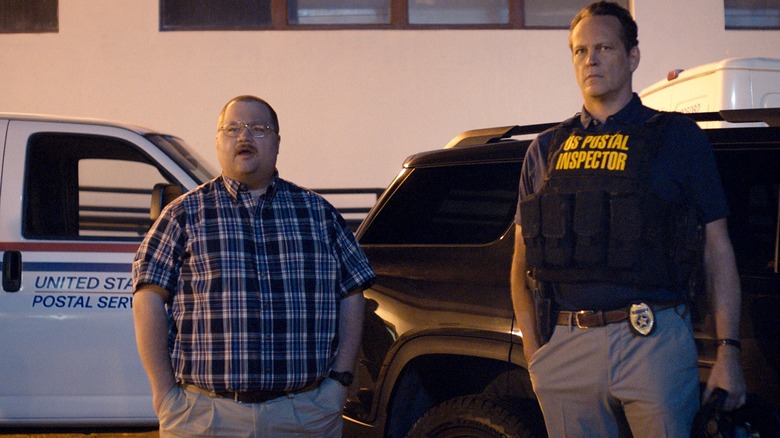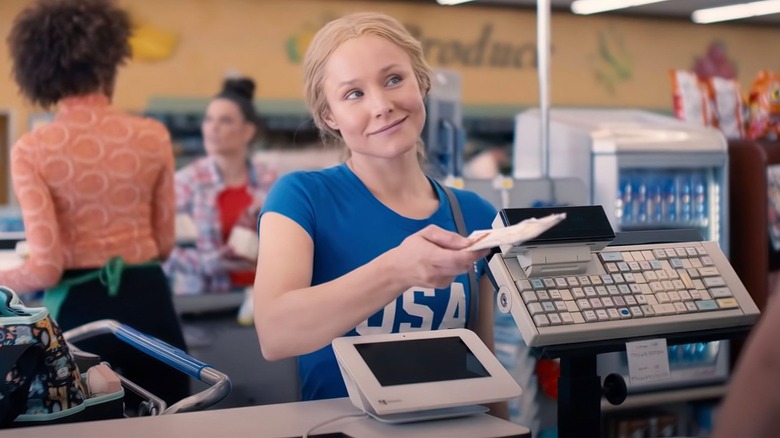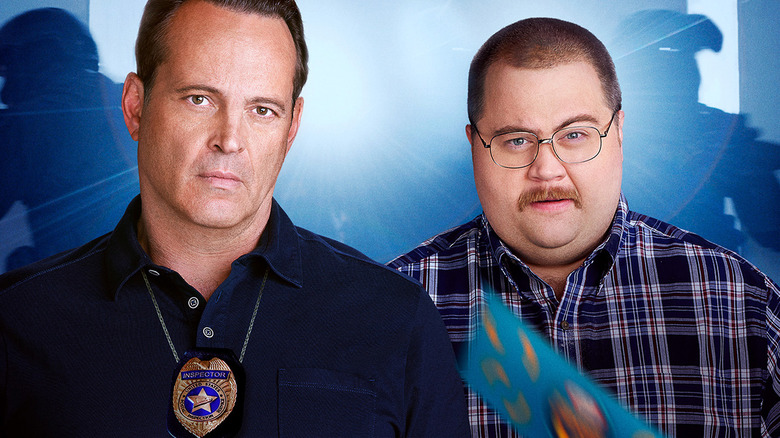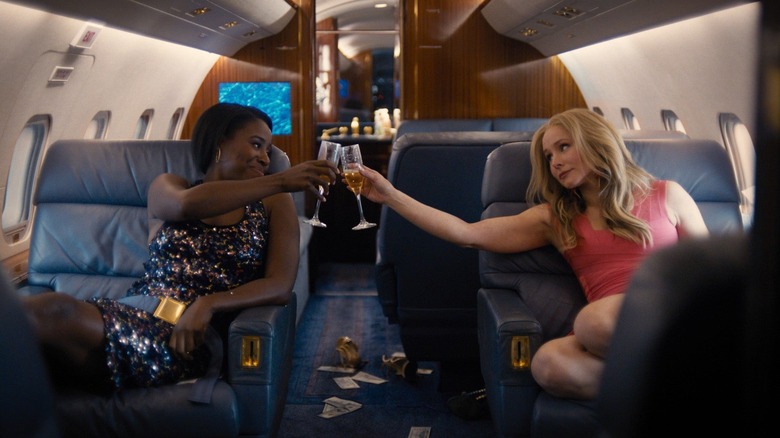Queenpins Directors Break Down The Movie's $40 Million Extreme Couponing Scam [Interview]
Aron Gaudet and Gita Pullapilly had a specific ambition in mind with their new film, "Queenpins." "What we realized is we wanted to write this love letter to the post office," Pullapilly said. Not only that, but for audiences to leave their comedy about a crime involving counterfeit coupons and write a letter to a loved one. The pure power of letters, as well as the dangerous power of coupons, is the moral of this crime story.
The married filmmaking duo previously directed "Beneath the Harvest Sky." With "Queenpins," they've written and directed their first comedy. It's a change of pace they hope opens the door to directing another crime film they've been working on for years about Operation Greylord, which Adam McKay is producing. With "Queenpins" in theaters this weekend, the writer-directors told us all about their deep dive into the world of coupons and the postal office police. Their obsession is warranted.
"A $40 million coupon scam."
This is such a laughably specific crime.
Aron: Coupons, we exchange drugs for coupons.
Gita: It was inspired by a true story of two women who counterfeited coupons in Phoenix, Arizona and I was on a coupon blog randomly. I saw three lines that talked about a $40 million coupon scam and I happened to have the name of the detective from Phoenix, Arizona who investigated the case. As soon as I read that, I was like, "Aron, this is so obscure. Do you think this is real?" We called the detective, and within a week we were in a car to Phoenix just researching the story and realized this could absolutely be an Aron-Gita film, even though we've never done a comedy before.
How was your first experience writing comedy?
Aron: I think we approached it the same way as the more dramatic stuff we had written. And it just seemed because it was counterfeit coupons, and women making millions of dollars, and postal inspectors, that it just felt like it should be a comedy, and it naturally became that when we were writing it. I think our process was the same, but we just leaned in and it was like, "This should be funny. This should be a little absurd." It was interesting, it didn't feel different until we gave the script to our agents. They read it, and they came back, and they said, "We didn't know you were funny." And we're like, "Oh, okay. But... "
Gita: It's really on them more than on us.
[Laughs] That's a very backhanded compliment.
Gita: Yeah, exactly. Also, we realized life and just the world around us is absurd and if you keep to the truth and honesty of it, it has these comedic moments in life. I think that's what emboldened us to be able to write this comedy was saying the comedy will come from these situations because life is funny, so let's just keep it real.
"The psychology of coupons."
I often hear from writers that comedy is a lot harder than drama. Was that the case for both of you?
Aron: I think comedy is the hardest thing to pull off, for sure. It helped when we really just went off what we found funny to ourselves at first. And then as people read the script and responded to it, and then as it went out to comedic actors like Kristen Bell, and Kirby [Howell-Baptiste], and Paul [Walter Hauser], and Vince [Vaughn], and they all found it funny. When we would meet with them it gave us the confidence that it's like, "Okay, we wrote a good comedy script," and now you bring in all of these comedic actors and they only make it stronger. They take something that, hopefully, is funny on the page, but they're able to find every last bit of humor in how they deliver it or their reactions on their faces. And so then it was really just trying to be true and grounded and honest with the characters while still trying to be funny.
Paul Walter Hauser doesn't have to do much to get a laugh.
Gita: We agree.
Aron: He doesn't even have to say things usually and we're already laughing.
Is his character a wrestling fan because Hauser is a major wrestling fan?
Aron: That was absolutely an influence. Behind him on a shelf in one scene are these wrestling figures. Those were all really Paul's that he brought in. We asked if he could bring them in and put them there. What was on television actually, we were able to use that wrestling clip because he's friends with the guy that owns AEW Wrestling. So he helped us get the permissions and stuff to use that.
Even though it's a comedy, do you do as much intense research for a crime drama like "Operation Greylord?"
Gita: A hundred percent.
Aron: We did. We took really deep dives into couponing, the psychology of coupons, postal inspectors, so many different aspects in the story. We researched a lot because, again, we treated it the same way and we wanted it to feel just as real and authentic and layered. We would never want to do a comedy that's just a surface-level silly comedy. For us it was like, how can we give this heart and depth? And how can we build these layers in whether people realize it or not? Hopefully, subliminally they're taking in some of these themes we're talking about and ideas that we're talking about.
Gita: We always layer a little bit about social issues throughout the story as well. Even if it's a comedy, it is just kind of our thoughts on where we are in society today. But it's all very subtle because it's just posing questions about life in our movies. And I think when audiences watch it, they sometimes take away from that "yeah, where do I stand on this issue?"
"We are sucking you into our coupon vortex."
Is it true people get a high from using coupons?
Aron: It is, yeah. It is this feeling of getting a little win and it releases a little dopamine or something and people feel this coupon high.
Gita: Have you used coupons before?
No, but I have friends who are obsessive about it.
Gita: Honestly, go to CVS, buy something, put your membership in your phone number or whatever. And then you'll get these CVS bucks, which is like, you got $2 or something off at CVS. I went in the other day, had to buy something, came out and I saw I got $2 off. Literally turned around, went back into the grocery store. I was like, I have to use this.
Aron: There's a whole psychology behind any buyer when they pick up what they want to buy. It's like, is this a need or is this a want? Do I need it? Or do I just want it? And coupons are such a big part of our economy because they put this ticking clock on it that make people shift over to "I need it because I need to get it while it's on sale. Well, I can get this discount." So coupons are a huge driver of our economy.
Gita: Yeah, it's the foundation of our economy. If you stop using coupons you could really basically tank the US economy, which is crazy because other countries don't use coupons. But a good example of this is years ago, JCPenney, a new CEO came in and said, what happens if we just do equal pricing for all?
Aron: We're going to get rid of coupons, just do everyday low prices.
Gita: Which seems great, right? Except what happened all of a sudden that urgency to buy wasn't there. He almost bankrupted the company and JCPenney lost $4 billion. Look it up. It's a true story.
Aron: His name was Ron Johnson. He had worked at Apple. He created the Genius Bar and then went to JCPenney and almost bankrupted them.
I imagine he didn't keep that job, right?
Aron: No. I don't think so. I think that was a bad mistake. Getting rid of coupons.
Gita: But that really isn't on him. In a normal business concept you would want everyday prices, but it's really the psychological effect of how we've trained people to use coupons. Cause the first coupon was from a bottle of Coke in the early 1900's. It was for a free bottle of Coke.
Aron: [Laughs] We know so much about coupons. We're really experts.
Gita: [Laughs] We are now all trained to have a ticking time clock. Now digitally, it's the ticking time clock of, buy any and you have two hours before your black Friday thing goes away or whatever it is. We are just trained rabbits to shop.
Aron: We are sucking you into our coupon vortex.
"The power of the post office."
It is fascinating. What about the postal office? What did you learn about how they operate?
Aron: That was another deep dive where we weren't that familiar with postal inspectors ahead of time. And then we start researching it and we find out it's the oldest branch of law enforcement in our country and they've been involved in a lot of big criminal investigations. They brought down the Unabomber because in a lot of cases, a lot of criminal investigations involve somebody using the mail to commit crimes and then they get involved and they're pretty badass. If you search on YouTube, there are videos that the postal inspectors put out that's them doing raids and doing all of this stuff. It gave us this whole new appreciation for the post office, the mail postal inspectors.
Gita: Yeah, absolutely. What we realized also is we really wanted to write this love letter to the post office. And when we were talking to Vince and Paul, Vince had this great idea. He was like "what if I had these old letters in my pocket, these World War I letters that I carry around, and I just pull them out. And I have these gloves on."
We were laughing as he was talking to us about this in prep. And then we realized no, this is actually perfect to his character, but also the power of a letter. We hope that people see this movie and decide to write a letter to someone in their life that they love and they appreciate, and they value it. Because having a letter in your hand means that someone took the time to write it, to say, I love you. I care about you. And it's the power of the post office that makes that possible. And so we hope that people start taking up letter writing because of "Queenpins."
Aron: Our friend Leo was there and he said, "Hey, my grandfather fought in World War I and would actually write letters to my grandmother. We still have them." He had his wife send these letters out and we started reading them, and they were so beautiful. So the two letters in the movie are based off of these actual letters that this real Leo Sullivan had written to this Mary Sullivan in World War I. So it all became this sort of organic process, but they're based on real World War I letters.
Gita: If you look at the letters that are in the movie you'll see, it's actually the same name, address all of that stuff.
"A story about judicial corruption."
That's very cool. I have to ask, what's happening with the Operation Greylord film? That's a great story.
Gita: It is a story we wanted to make for seven years before we could get "Queenpins" off the ground and we had to make "Queenpins" in order for us to make "Crook County" because "Crook County" is a much bigger budget movie.
Aron: It's a period piece, and it's a big cast.
Gita: It's the true story of a lawyer in 1980 Chicago, who goes undercover for the FBI and ends up taking down a hundred corrupt judges, lawyers and cops in the Cook County courthouses. Completely true. It just really is a story about judicial corruption.
Aron: It's very much like a "Donnie Brasco" kind of story.
Gita: With a little Sidney Lumet and a little "Goodfellas" mixed in for sure. We have Adam McKay on the project executive producing it. We have Donna Gigliotti, who's a great producer, too.
Aron: We're currently trying to cast it now and get it back off the ground and hopefully make it in next. The entire goal in making "Queenpins" was to give us more leverage to make that movie the way we knew it needed to be made and get the budget we needed to make it right.
"Queenpins" is in theaters now and will be available to stream on Paramount+ on September 30, 2021.





